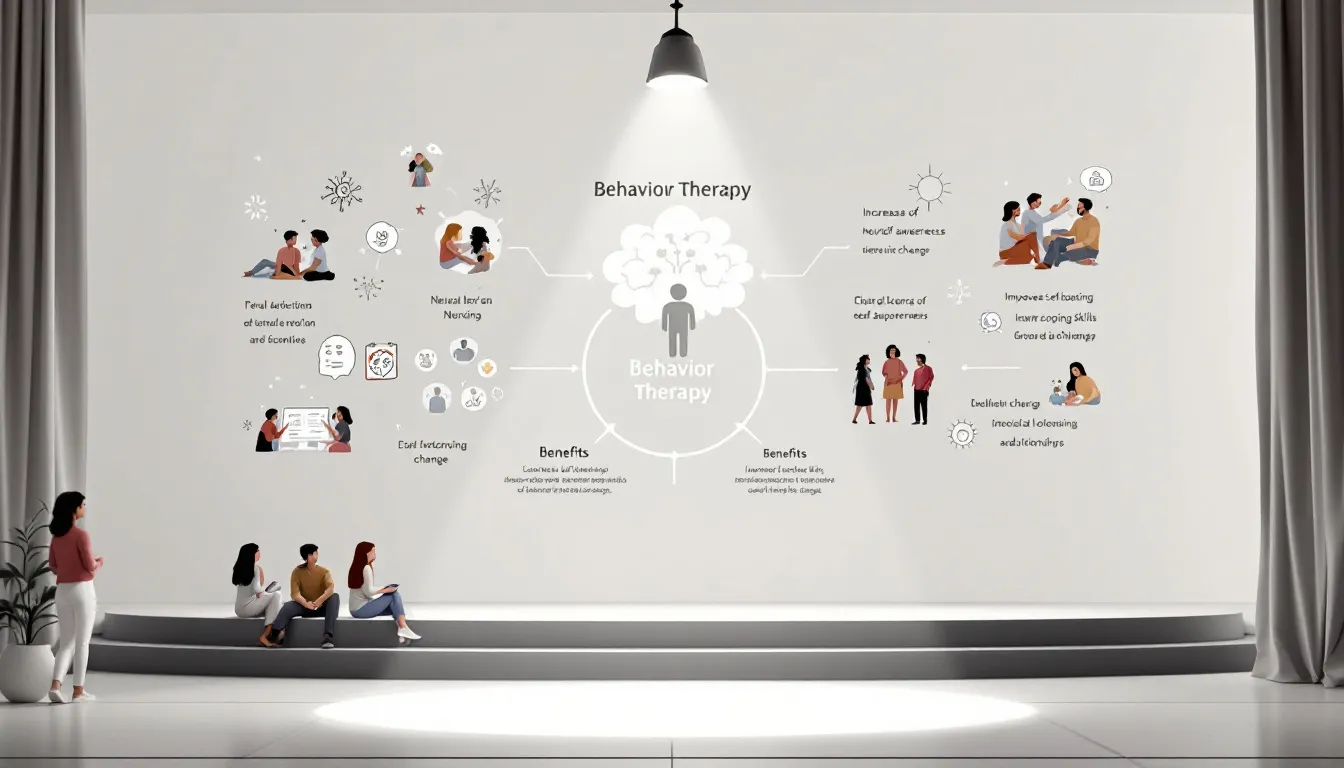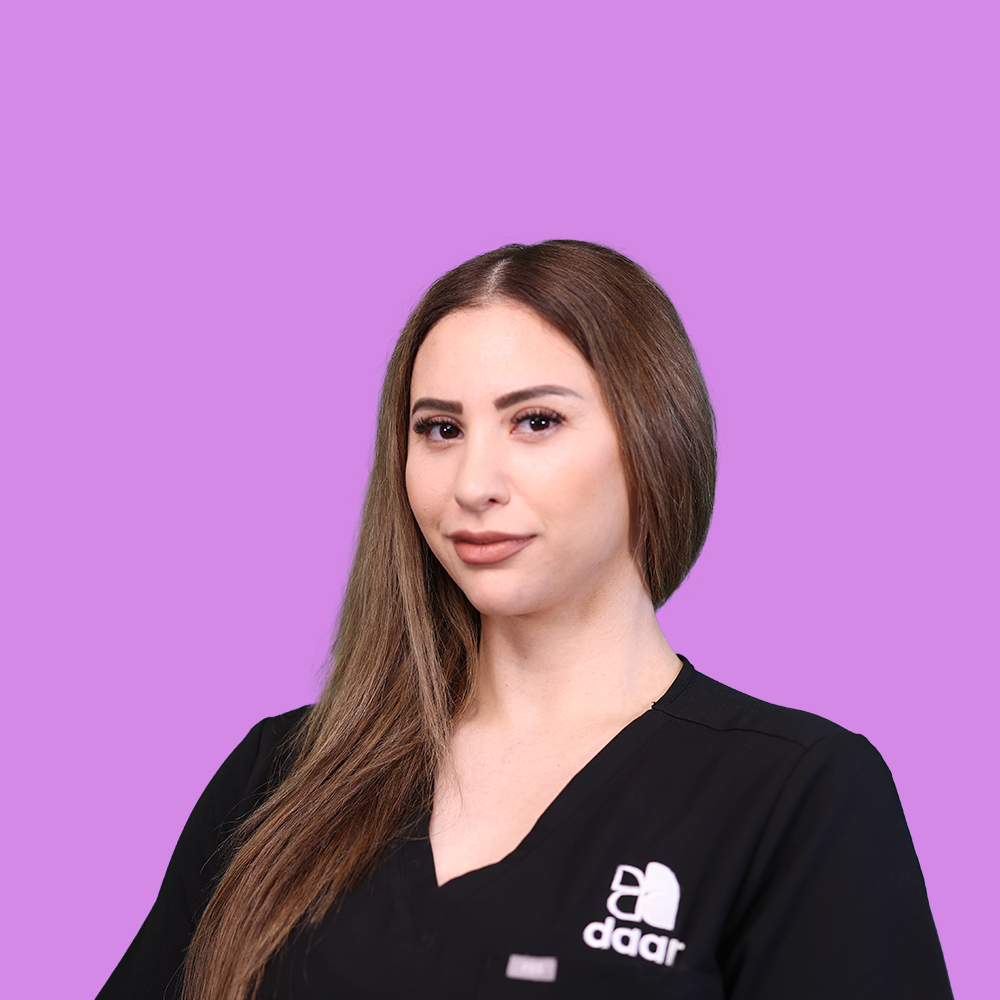
the best approaches to effective behaviour therapy
20 March, 2025
Effective Behaviour Therapy Techniques: A Comprehensive Guide
Behavior therapy focuses on changing negative behaviors through practical techniques. It’s an action-based approach aimed at dealing with current problems rather than past issues. This guide will explore how behaviour therapy works, its techniques, and how it can help improve mental health.
Key Takeaways
-
Behaviour therapy focuses on modifying present-day behaviors to address psychological issues, prioritizing immediate solutions over exploring past experiences.
-
Key types of behaviour therapy, including Cognitive Behavioral Therapy (CBT), Dialectical Behavior Therapy (DBT), and Acceptance and Commitment Therapy (ACT), provide diverse strategies tailored to specific mental health conditions.
-
Behaviour therapy has proven effective in treating various conditions such as anxiety disorders and depression, emphasizing the need for personalized treatment plans that may incorporate combined therapeutic approaches.
Understanding Behaviour Therapy

Behavior therapy is an active, practical approach aimed at solving psychological challenges. It seeks to promote positive behaviors and eliminate negative ones by focusing on actionable changes rather than delving into historical causes of issues. This method puts emphasis on present-day functioning and providing hands-on solutions for immediate problems, instead of exploring past experiences like some other therapeutic approaches might do.
A significant advantage of behavior therapy is its concentration on current difficulties and the execution of strategies designed to alter unhelpful behaviors. Although it may not fully consider the role that interpersonal relationships play in these issues, its strength lies in addressing pressing concerns directly with effective action.
As the field progresses, behavioral and cognitive therapies are increasingly refined to address a broader range of individual needs more effectively. Cognitive therapies complement this progression by offering hope through their ability to produce measurable outcomes for those they serve.
Key Types of Behaviour Therapy

There are multiple forms of behavioural therapy available, all designed to address various psychological issues with distinct methodologies. Prominent among these therapies are Cognitive Behavioural Therapy (CBT), Dialectical Behavior Therapy (DBT), and Acceptance and Commitment Therapy (ACT).
Selecting the appropriate type of therapy typically relies on the particular mental health condition in question as well as the intensity of the experienced symptoms. Each therapeutic approach offers a variety of strategies and practices aimed at aiding people in effectively regulating their mental well-being.
Cognitive Behavioral Therapy (CBT)
Cognitive behavior therapy (CBT) is an effective combination of cognitive and behavioral strategies aimed at altering maladaptive thoughts and actions. It is based on the notion that our thought patterns have a significant influence on our emotional health and behavior. Through recognizing and disputing negative beliefs, cognitive behavior therapy enables the cultivation of healthier thinking processes and more suitable behaviors by employing cognitive restructuring.
The process within CBT unfolds across multiple phases, beginning with an assessment along with educating individuals about their specific concerns. Subsequent to this, objectives are established alongside learning new tactics for tackling detrimental thoughts and actions. The active engagement from patients is essential as they often partake in homework assignments to consolidate the lessons learned during therapeutic sessions.
Establishing goals plays a pivotal role in CBT by directing treatment efforts while also tracking advancements made through therapy. Patients actively contribute to their recovery journey by acquiring skills necessary for addressing challenging thoughts or behaviours head-on. This proactive element guarantees that individuals possess adequate resources to handle their issues proficiently.
CBT’s strength lies in its capacity to yield swift enhancements in life quality. It equips people with practical self-help methods which allow them manage mental health challenges effectively thereby improving overall wellbeing.
Dialectical Behavior Therapy (DBT)
Dialectical behavior therapy (DBT) is a type of cognitive therapy that concentrates on four primary areas.
-
Mindfulness
-
Regulation of emotions
-
Tolerance to distress
-
Effectiveness in interpersonal situations
By teaching an array of skills and strategies for coping, DBT assists individuals in better managing their emotional responses and actions. It has become an important tool for those grappling with powerful emotional states.
Originally devised to aid people with borderline personality disorder (BPD), the use of DBT has broadened significantly. It now addresses various conditions including substance abuse and other significant mental health challenges, underscoring its adaptability and success within clinical settings.
Acceptance and Commitment Therapy (ACT)
Acceptance and Commitment Therapy (ACT) integrates mindfulness techniques with tactics for embracing acceptance, all aimed at bolstering psychological flexibility. This type of adaptability is essential as it enables individuals to adjust their actions to reflect their core values, a critical aspect in pursuing a gratifying life.
Through the use of commitment strategies alongside behavior modification tools, ACT assists people in enacting transformative changes within their lives. By centering attention on significant personal values, individuals are guided toward making impactful shifts that foster improved mental and emotional health.
Techniques Used in Behaviour Therapy
Behavior therapy utilizes various strategies based on the principles of classical and operant conditioning. Classical conditioning focuses on creating associations between different stimuli to modify behavior, while operant conditioning centers around utilizing reinforcement and punishment to influence the frequency of specific behaviors.
The techniques rooted in these principles are foundational to numerous therapeutic approaches incorporated within behavior therapy.
Exposure Therapy
Exposure therapy serves as a fundamental approach in the treatment of anxiety disorders by systematically exposing individuals to their fears, which diminishes their sensitivity to stimuli that trigger anxiety. This technique fosters increased resilience and better management of anxious responses.
In addressing OCD specifically, exposure therapy is employed through deliberate contact with feared stimuli within a structured framework. Referred to as exposure and response prevention, this method has proven highly successful in lessening the frequency of compulsive behaviors associated with OCD symptoms.
Systematic Desensitization
Another technique stemming from classical conditioning employed in behavior therapy is systematic desensitization. This method trains individuals in relaxation and breathing strategies to regulate their physiological reactions. After mastering these approaches, individuals confront a sequenced array of fears, beginning with the least distressing and progressing to the most challenging, all while applying relaxation techniques.
Through this step-by-step approach to exposure, people learn to encounter their anxieties in a regulated and tolerable manner. The outcome is a diminished general anxiety level and an enhancement in stress management capabilities.
Aversion Therapy
Aversion therapy is an effective technique that pairs a typically enjoyable but harmful stimulus with an unpleasant one to deter maladaptive behaviors. This approach is especially successful in addressing alcohol use disorders and substance use disorders, as the adverse feelings elicited by the aversive stimulus can diminish the craving for the detrimental behavior.
Benefits of Behaviour Therapy

Behavior therapy stands out due to its potential for rapid outcomes and cost-effectiveness, presenting a compelling choice for those in search of efficient treatment options for diverse mental health conditions. It has been shown to considerably diminish symptoms of depression, thereby improving everyday functioning and enriching one’s quality of life.
Specifically, Acceptance and Commitment Therapy (ACT) fosters psychological adaptability by employing mindfulness techniques alongside acceptance practices. It inspires people to adhere to their core values and implement significant changes in their existence. The comprehensive nature of this approach guarantees that the advantages gained from behaviour therapy are both significant and enduring.
Conditions Treated by Behaviour Therapy

Cognitive behavioural therapy (CBT) is a robust form of treatment that has shown to be successful in managing various mental health conditions, such as anxiety disorders, depression, obsessive-compulsive disorder, and phobias.
As a leading approach within the domain of behavioural therapy, CBT stands out for its effectiveness in confronting multiple psychological challenges and represents a fundamental component of effective mental health treatment.
Anxiety Disorders
Exposure therapy presents a methodical approach to alleviate the intensity of reactions to triggers of anxiety disorders by progressively engaging with situations that provoke fear. This technique is especially successful in addressing phobias via systematic desensitization, enabling individuals to incrementally master their anxiety responses.
In conjunction with this, behavioral therapy has demonstrated efficacy in controlling panic attacks and mitigating the harshness of symptoms associated with anxiety. By employing these strategies, individuals can reclaim dominance over their existence and diminish the influence that anxiety disorders have on them.
Depression
A modular approach designed specifically for depressed adolescents, the CBT protocol from the Treatment of Adolescents with Depression Study (TADS), has demonstrated considerable success in reducing depressive symptoms and enhancing life quality for young people.
Often, behaviour therapy proves beneficial in managing symptoms of depression and bolstering everyday functioning. By focusing on present concerns and altering thoughts and behaviors that are unhelpful, significant enhancements in mental health can be achieved.
Obsessive Compulsive Disorder (OCD)
Managing OCD effectively can be difficult, and the condition seldom gets better without appropriate intervention. Cognitive-behavioral therapy (CBT) is a scientifically supported method that has proven successful in controlling the symptoms of OCD.
The ‘OCD? Not Me!’ initiative offers a targeted treatment plan for young people living with OCD, consisting of four sessions. This organized method guarantees that these individuals are furnished with essential support and strategies to cope with their disorder efficiently.
Effectiveness of Behaviour Therapy

Behavioural therapy has proven to be significantly successful in addressing numerous mental health problems, such as anxiety disorders, post traumatic stress disorder, depression, and obsessive-compulsive disorder (OCD). Research indicates that 67% of individuals see an improvement in their condition after undergoing psychotherapy. Specifically for cognitive behavioural therapy (CBT), this figure rises to 75%, with observable results typically manifesting within a range of five to twenty sessions.
Nevertheless, when dealing with more complex issues, relying solely on behavioural therapy may not provide comprehensive relief. In these instances, employing combined therapies that incorporate various treatment approaches tends to yield greater effectiveness.
Considerations When Choosing Behaviour Therapy
Selecting an appropriate behavior therapy necessitates various factors to be taken into account. It is usually beneficial to start by talking with a general practitioner (GP) who can guide you and offer referrals for expert care. For those in Australia, the Australian Psychological Society offers a directory that can assist in locating a suitable psychologist.
There are mental health practitioners who deliver therapy services online, which is particularly convenient for individuals unable to participate in face-to-face sessions.
Suitability for Complex Mental Health Conditions
In the treatment of significant psychiatric conditions, including severe depression and schizophrenia, it is frequently necessary to supplement behavioural therapy with additional therapies. For example, Cognitive Behavioral Therapy (CBT) can be employed in conjunction with medication and counseling for improved results. This holistic strategy ensures that all aspects of the disorder are tackled, leading to a more complete plan for treatment.
Initiatives like ‘OCD’? Not Me!’ provide specialized treatment pathways for young people dealing with OCD, underscoring the necessity for customized intervention plans suited to intricate issues. Such an approach guarantees that each individual receives an appropriate blend of therapeutic modalities tailored to their specific needs.
Addressing Underlying Problems
Behavioral therapies tend to center on rectifying present functional difficulties, typically bypassing profound interpersonal issues that may exist. Although this strategy can be efficient for immediate challenges, it might disregard the underlying circumstances and relationships that are instrumental in the development of mental health problems. Thus, recognizing both the constraints and advantages inherent in various behavioral strategies is key for administering effective treatment.
The success of different types of behaviour therapy is shaped by the particular mental health issues at hand as well as what each person requires. This underscores how crucial it is to devise treatment plans tailored to an individual’s needs while taking into account not just their superficial symptoms but also any deeper-rooted concerns they may have.
How to Start Behaviour Therapy
Initiating behaviour therapy entails locating a skilled mental health professional with specialization in this area. Cognitive behavioural therapy tends to be more affordable than various other forms of treatment, which allows it to be within reach for numerous people. To enhance the productivity of the initial therapy session, it’s advantageous to come equipped with prepared questions.
Taking an active and ready stance enables individuals to fully benefit from their therapeutic encounters, thus establishing a solid base for their path towards improved mental health.
Summary
Behavior therapy offers a range of effective techniques and approaches to address various psychological issues. From CBT and DBT to ACT, these therapies provide practical solutions to modify unhelpful thoughts and behaviors. They are effective in treating conditions like anxiety disorders, depression, and OCD, and can significantly improve quality of life. By understanding the different types of behaviour therapy and how to start, individuals can take the first step towards a healthier, more fulfilling life.
Book Your First Appointment for Behaviour Therapy Today!
Ready to take the first step towards positive change? Don't wait any longer! Book your first appointment for Behaviour Therapy with us today. Our experienced team is here to guide you on your journey to improved mental health. Call us now at 0291332500 and start transforming your life through Behaviour Therapy.
Frequently Asked Questions
What is the primary goal of behaviour therapy?
The primary goal of behavior therapy is to reinforce desirable behaviors while eliminating unwanted ones, ultimately promoting positive change in individuals.
How does Cognitive Behavioral Therapy (CBT) work?
Cognitive Behavioral Therapy (CBT) effectively identifies and challenges negative beliefs, promoting healthier thinking and adaptive behaviors. This structured approach helps individuals make lasting changes in their mental health.
What conditions can behaviour therapy treat?
Behavior therapy is effective in treating conditions such as anxiety disorders, depression, obsessive-compulsive disorder (OCD), and phobias. Its structured approach helps individuals manage and overcome these challenges.
How many sessions are typically needed for CBT?
Cognitive behavioral therapy (CBT) takes about 5 to 20 sessions for noticeable outcomes to emerge.
The number of sessions needed can differ based on the unique requirements of the individual and the complexity of their specific problems.
Is behaviour therapy effective for complex mental health conditions?
For complex mental health conditions, relying solely on behavior therapy is usually not enough. Better results are often achieved when it is combined with other therapeutic strategies.
.svg)









